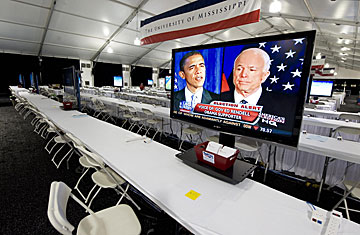
A presidential campaign hurtling into its final weeks and a financial crisis that is gathering steam at an even faster clip have collided headlong, bringing a virtual halt to one world, and both confusion and the promise of catharsis to the other.
Following a morning conversation on Wednesday between Barack Obama and John McCain, the Republican candidate said he was suspending his campaign to return to Washington to work on the bailout plan and vowed to skip the debate with Obama in Oxford, Miss., on Friday night unless a deal — or at least the outlines of a deal — is put in place.
Obama, who had discussed issuing a joint statement of resolve about a bailout plan with McCain earlier in the day, announced in late afternoon that he would prefer to stick to the original debate schedule — a move that left McCain's team hoping for a resolution to the financial bailout negotiations before Friday night.
McCain's move could serve to jolt House Republicans into stepping up support for the plan today — if only to speed McCain's way to Mississippi tomorrow night.
All this activity came amid several days of Democratic pressure on the White House to do or say something that would force enough Republican House members to support the unpopular Bush bailout plan proposed by Treasury Secretary Henry Paulson over the weekend — pressure that led to President Bush's 15-min. prime-time address last night. Democrats have been unwilling to whip members of their own caucus to support the plan without a full White House push of GOP members. Bush, therefore, turned up the heat. "Our country could experience a long and painful recession," he warned. "Fellow citizens, we must not let this happen."
McCain's dramatic promise to suspend his campaign until the crisis is resolved in Congress was on one level a heady attention-grabbing move, but it could also be viewed as a gamble in the face of political necessity. His poll ratings have sunk noticeably in recent days, as voters leaned toward the Democrats in a time of economic worry. The suspension was designed in part to commandeer an issue that has belonged to Obama and to try and show above-the-fray bipartisan leadership of the kind independent voters appreciate.
Why either Obama or McCain would be needed in Washington to help work out a deal is unclear. Neither man sits on the Senate Banking Committee; much of the difficult political horse-trading is taking place in the House, not the Senate; and the outlines of a deal are becoming fairly apparent, even if all the votes for it have not yet materialized.
Both candidates will be joining Bush at the White House for a meeting of congressional leaders this afternoon, something McCain had called on Bush to organize yesterday. The meeting is expected to be brief.
(To see how TIME has covered Wall Street over the years, click here.)
(Click here for Pictures of the Week.)
(Click here for 10 Memorable Debate Moments.)
